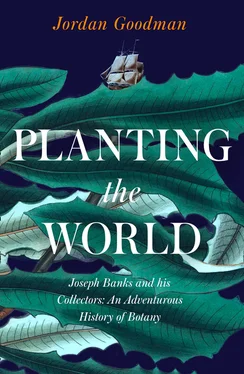William Aiton (1731–93). Head Gardener Kew 1759–93, Banks’s main contact at the royal garden
William Townsend Aiton (1766–1849). Son of the above and Head Gardener Kew 1793–1841, taking over his father’s duties and contact with Banks
William Alexander (1767–1816). Artist to the Macartney embassy to China 1792–4
John Allen (1773–1806). Lead miner, Banks’s appointed mineralogist on HMS Investigator 1801–3
William Amherst (1773–1857) 1st Earl Amherst of Arracan. Leader of the third British embassy to China (Amherst embassy) 1816–17, Governor-General of India 1823–8
James Anderson (1738–1809). Physician General East India Company Madras, naturalist, first person to bring cochineal to Banks’s attention in 1786
George Austin (?–1790). Banks’s appointed gardener on HMS Guardian 1789
Joseph Banks (1743–1820). Botanist, President of the Royal Society
Sarah Sophia Banks (1744–1818). Sister of Joseph Banks
(Lady) Dorothea Banks (1758–1828). Wife of Joseph Banks
Francis Baring (1740–1810). Banker, head of Baring and Co. London’s chief merchant bank, Director 1779–1810 and Chairman East India Company 1792–3, responsible for the Company’s role in the Macartney embassy to China 1792–4
Francis Louis Barrillier (1773–1853). Army officer, surveyor in New South Wales 1800–3
John Barrow (1764–1848). Comptroller on Macartney embassy to China 1792–4, Secretary to George Macartney Cape Colony 1797–1804, Second Secretary to the Admiralty 1804–45
Henry Bathurst (1762–1834) 3rd Earl Bathurst. Politician, Secretary of State for War and the Colonies 1812–27
Nicolas Thomas Baudin (1754–1803). Naval officer, commander French exploration vessel Le Géographe on its intended circumnavigation of Australia 1800–3, met Matthew Flinders in present-day South Australia in April 1802
Franz Bauer (1758–1840). Botanical artist active at Kew
Ferdinand Bauer (1760–1826). Botanical artist, brother of the above, Banks’s appointed artist on HMS Investigator 1801–3
Lord Beauchamp. See Francis Seymour Conway
Andreas Berlin (1746–73). Botanist, student of Linnaeus, plant collector in Sierra Leone alongside Henry Smeathman 1773
Charles Blagden (1748–1820). Physician, Secretary to the Royal Society 1784–97, Banks’s confidant
John Bradby Blake (1745–73). Supercargo East India Company Canton 1770–3, co-producer of hybrid Chinese-British botanical drawings
William Bligh (1754–1817). Naval officer, commander HMS Bounty and HMS Providence 1787–9 and 1791–3 respectively, Fourth Governor of New South Wales 1806–8
Essex Henry Bond (1762–1819). Naval officer, commander East India Company ship Royal Admiral
Jacob Bosanquet (1755–1828). Director from 1782, Deputy-Chairman Court of Directors 1797, 1802, 1810, Chairman Court of Directors 1798, 1803, 1811 East India Company
James Bowie (c.1789–1869). Gardener, Banks’s plant collector in Brazil 1814–16 and at the Cape 1816–23
William Broughton (1762–1821). Naval officer, commander HMS Chatham 1791–3
Robert Brown (1773–1858). Botanist, Banks’s plant collector in Australia on HMS Investigator 1801–3, Banks’s librarian 1810–20
Earl of Buckinghamshire. See Robert Hobart
Charles Bunbury (1740–1821). Politician, Chairman Bunbury Committee on crime and punishment 1778–9
David Burton (?–1792). Gardener, Banks’s plant collector in Australia
George Caley (1770–1829). Gardener, botanist, Banks’s plant collector in Australia 1800–10, Superintendent St Vincent Botanic Garden 1816–22
John Call (1731–1801). Engineer, politician, promoted transportation and the establishment of penal colonies
Duncan Campbell (1726–1803). Merchant, shipowner, contractor for transportation and for the provision of convict hulks
Lord Castlereagh (1769–1822). Politician, President of the Board of Control 1802–6
Charles Cathcart (1759–88). Military officer, politician, leader of the first British embassy to China (Cathcart embassy) 1787–8
Henry Chamberlain (1773–1829). Diplomat, British consul-general in Brazil, an important contact for James Bowie and Allan Cunningham while plant collecting in Brazil
John Clarkson (1764–1828). Naval officer, abolitionist, Governor of Sierra Leone 1792, responsible for bringing the first settlers from Nova Scotia
David Collins (1756–1810). Military officer, judge advocate of New South Wales 1788–96
James Colnett (1753–1806). Naval officer, fur trader, commander merchant vessel Prince of Wales 1786–8
Francis Seymour Conway (1743–1822) Lord Beauchamp. Politician, headed the Beauchamp Committee hearings into transportation 1785
James Cook (1728–79). Naval officer, explorer, commander HMS Endeavour 1768–71, HMS Resolution 1772–5, 1776–9
John Cranch (1758–1816). Naturalist on HMS Congo 1816
John Crosley (1762–1817). Astronomer on HMS Investigator 1801–3
Allan Cunningham (1791–1839). Gardener, Banks’s plant collector in Brazil 1814–16 and Australia 1816–31
Alexander Dalrymple (1737–1808). Cartographer, First Hydrographer of the British Admiralty 1795–1808
Nathaniel Dance (1748–1827). Naval officer, commander East India Company ship Earl Camden 1802–4 engaging French fleet in the Battle of Pulo Aura 1804
William Devaynes (1730–1809). Politician, merchant, banker, Chairman East India Company 1770–1807 passim
James Dickson (c.1738–1822). Botanist, nurseryman in Covent Garden
George Dixon (1748–95). Naval officer, fur trader, commander merchant vessel Queen Charlotte 1785–8
Jonas Dryander (1748–1810). Botanist, Banks’s librarian 1782–1810
Alexander Duncan (1758–1832). Surgeon to the East India Company Canton 1788–97, Banks’s plant collector in Canton during this period
John Duncan (1751–1831). Brother of the above, Surgeon to the East India Company Canton 1783–8, Banks’s plant collector in Canton during this period
Henry Dundas (1742–1811) 1st Viscount Melville. Politician, Treasurer of the Navy 1782–1800, Home Secretary 1791–4, President Board of Control 1793–1801, Secretary of State for War 1794–1801, First Lord of the Admiralty 1804–5
Hinton East (?–1792). Planter, botanist, Receiver-General of Jamaica 1779, Banks’s important contact in Jamaica
John Ellis (c.1710–76). Naturalist, early proponent and supporter of the Linnaean classificatory system
Richard Cadman Etches (1744–1817). Merchant, entrepreneur, formed the King George’s Sound Company the first British company to trade for furs in the Pacific Northwest 1785
Matthew Flinders (1774–1814). Naval officer, commander HMS Investigator 1801–3
George III (1738–1820). King of the United Kingdom 1760–1820
Hugh Gillan (?1745–98). Physician to the Macartney embassy to China 1792–4, plant collector in Brazil and China on this mission
Peter Good (?–1803). Gardener, Banks’s plant collector in Calcutta 1794, Banks’s appointed gardener and plant collector on HMS Investigator
William Goulburn (1784–1826). Politician, Under-Secretary of State for War and the Colonies 1812–21
Erasmus Gower (1742–1814). Naval officer, commander HMS Lion conveying members of the Macartney embassy to and from China 1792–4
Charles Green (1734–71). Astronomer on HMS Endeavour 1768–71
William Grenville (1759–1834) 1st Baron Grenville. Politician, Home Secretary 1789–91
Charles Francis Greville (1749–1809). Politician, antiquarian, collector
Читать дальше












